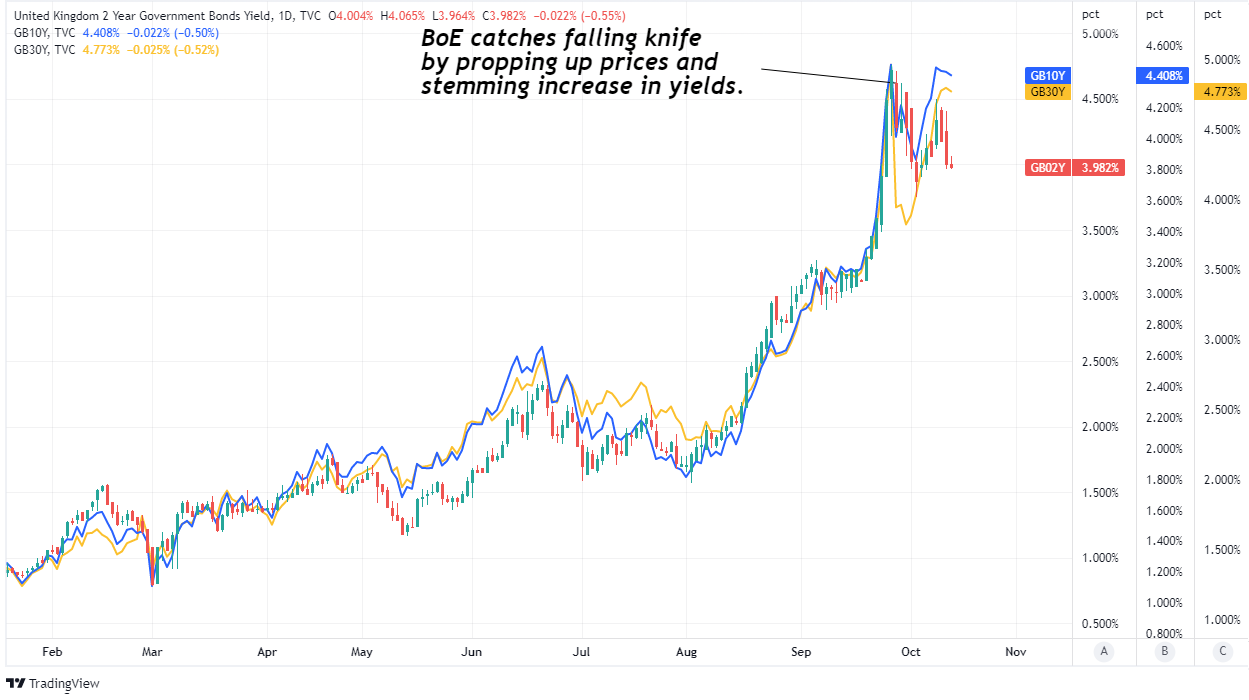Early End to BoE's Bond Market Intervention Could Cause Even Bigger Problems - Oxford Economics
- Written by: James Skinner
-
"We think this would materially worsen financial conditions in the UK and further damage the credibility of UK institutions, which is already in short supply. The exact consequences aren't knowable yet, due to the opacity of non-bank positions," - Oxford Economics

Image © David Holt, Accessed: Flikr, Licensing Conditions: Creative Commons
The Bank of England's (BoE) plan to curtail its emergency intervention in the government bond market at the end of this week could deepen a pending recession and impair the credibility of UK institutions if it comes too soon for the pension fund sector to handle, according to Oxford Economics.
Emergency purchases of government bonds have so far helped to prevent a self-perpetuation fire sale of the most important assets in the UK financial markets since the intervention programme began in late September but the BoE hopes to extricate itself from the market this Friday.
The programme has always been intended to end on October 14 but unease over that grew this week after BoE Governor Andrew Bailey reportedly told the Institute of International Finance Annual Membership Meeting in Washington on Tuesday that its interventions would end whatever the weather on Friday.
"The only argument against extending the intervention is on financial stability grounds. Proponents would argue that the Bank intervening further would create a moral hazard problem of bailing out funds when the rates rise," writes Innes McFee, chief global economist at Oxford Economics, in a Wednesday note.
"This is the same argument that the Bank used in 2008 when it failed to act quickly enough to provide additional liquidity to the interbank market. It ultimately reversed that decision, and we think it will U-turn again because that line of reasoning is deeply flawed," he adds.

McFee wrote to clients on Wednesday that pension funds are effectively innocent bystanders who've been caught unawares by a rout in the bond market that has led some of them to sustain significant losses, which have forced them to sell assets in a market with insufficient demand from buyers.
Bond prices do fall as bond yields rise, and yields do tend to rise with interest rates, which are also widely expected to rise further in the months ahead.
"But what if the Bank decides not to extend these purchases? We think this would materially worsen financial conditions in the UK and further damage the credibility of UK institutions, which is already in short supply. The exact consequences aren't knowable yet," he explains.
"But if gilt yields rise materially further from here it's reasonable to expect three developments: risk assets sell-off further including commercial real estate assets; mortgage rates rise higher, choking off demand in the housing market; and credit conditions tighten due to the volatility in rates," he adds.
McFee and the Oxford Economics team forecast the UK economy will shrink by 0.5% next year but warned on Wednesday that this downturn would deepen notably if there is a premature withdrawal of the BoE's backstop for the longer-term maturity part of the bond market.
UK government bond prices and yields had stabilised by Thursday following a fortnight of emergency purchases that have seen the BoE buying 30-year government bonds as well as inflation-proof securities known as linker bonds.
The intervention programme has most recently offered to buy up to £10bn of government bonds each day, of which up to £5bn is aimed at long-dated and conventional government bonds known as gilts while up to £5bn is intended to be spent on index-linked bonds referred to as linkers.
"In late September, UK financial assets saw further significant repricing, particularly affecting long-dated UK government debt. The rapid and unprecedented increase in yields exposed vulnerabilities associated with the leveraged liability-driven investment (LDI) funds in which many defined benefit pension schemes invest. This led to a vicious spiral of collateral calls and forced gilt sales that risked leading to further market dysfunction, creating a material risk to UK financial stability. This would have led to an unwarranted tightening of financing conditions and a reduction in the flow of credit to households and businesses," the BoE said itself on Wednesday.
"On 28 September, the FPC assessed the risk to UK financial stability from dysfunction in the gilt market. It recommended that action be taken to address it and welcomed the Bank’s plan for temporary and targeted purchases in the gilt market on financial stability grounds at an urgent pace. The Bank announced a temporary programme of purchases of long-dated UK government bonds until 14 October, and other measures. Real and nominal gilt yields fell materially following the initial announcement, creating an environment where LDI funds could build resilience to future shocks," it added.
The sell-off that led to the intervention came after the UK government announced a deficit deepening budget plan that prompted widespread criticism from economists and international institutions while leading many forecasters to raise their expectations for the BoE's Bank rate in the months ahead.
This late September rout in the bond market also came around the time that China's state-owned banks were reported to be preparing for a large round of intervention in the currency market to support the Renminbi on behalf of the central bank ahead of the Golden Week holiday, which likely would have involved selling foreign government bonds.
